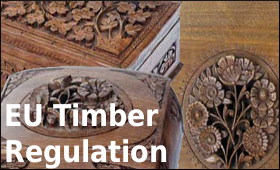|

|
EU timber regulation to hit India's handicraft exports
|
|

|
|
| Top Stories |
 |
|
|
|
Saurabh Gupta | 11 Feb, 2013
Indian woodware industry, a major contributor to handicraft exports, is likely to be hit severely as the country is not prepared to comply with the stringent European Union Timber Regulation (EUTR) that will come into force in 27 EU member states from March 3, said a nodal agency for promotion of exports of handicrafts products from India.
In order to address the problem of conflict timber and to promote trade in legal timber, the EU adopted a new EU Timber Regulation (EUTR) to combat trade in illegally harvested timber, which could impact hundreds of Indian small and medium enterprises (SMEs) and exporters, Chairman, Export Promotion Council for Handicrafts (EPCH), Arvind Vadhera told SME Times at a press conference in New Delhi recently.
"When this new law will come into force, it will change the entire scenario. This will cover all timber products including handicrafts and furniture," said Vadhera.
According to EPCH, this is one of a number of actions under the 2003 EU Action Plan on Forest Law Enforcement Governance and Trade (FLEGT), which entered into force on 2 December 2010 will, as of 3 March 2013, make it illegal to place illegally harvested timber and timber products on the EU market.
The legislation will require that due diligence is applied to all timber first placed on the EU market and also that traders, further down the supply chain, keep track of who timber or timber products were bought from, and where applicable, who they were sold to.
The Action Plan is implemented through Voluntary Partnership Agreements (VPAs) which are binding bilateral agreements between the EU and a timber-producing country. Each VPA that is entered into by the EU and a Partner country has to contain a Legality Assurance System (LAS).
However India has not signed a VPA with the EU and therefore Indian timber-exporters to the EU are not affected by the FLEGT Action Plan. And council is discussing the issue with the Government of India.
The regulation counters the trade in illegally harvested timber and timber products through three key obligations: 1) It prohibits the placing on the EU market of illegally harvested timber and products derived from such timber; 2) It requires EU traders who place timber products on the EU market for the first time to exercise 'due diligence'.
Once on the market, the timber and timber products may be sold on and/or transformed before they reach the final consumer. To allow for the traceability of timber products economic operators in this part of the supply chain (referred to as traders in the regulation) have an obligation to 3) keep records of their suppliers and customers, said EPCH.
Vadhera said that their exporters, and industry too, were not aware about the law and also don't have any idea about its consequences after implication.
He added that the council has already expressed concern over the issue before the government.
According to the provisional data available the exports of woodwares have shown an increase of 71.63 percent to USD 270.22 million during April-January 2012-13 over the similar period in 2011-12. During FY11-12 its' exports have increased by 45.86 percent to USD 325.40 million. The major EU countries cover over 40 percent market share of woodware exports from India.
EUTR will not only mandate companies to check where timber has been harvested or if it has been logged illegally, but will also allow inspectors to enter business premises and seize any illegally harvested wood, said businessgreen.com.
Placing illegally logged timber on the market will become a criminal offence, resulting in a penalty of up to two years' imprisonment and an unlimited fine, reports media.
|
|
|
| |
|
|
|
|
|
|
|
EU Timber Regulation
P S Padmanabham | Tue Feb 12 02:41:20 2013
SME Times is acting as a responsible news provider with the provision of information covering the aspects of new Timber Regulation. In fact, the above story is one of the first of its kind which is guiding about the law with a clear, concise guide.

|
|
|
|
|
|
|
| |
| Customs Exchange Rates |
| Currency |
Import |
Export |
US Dollar
|
84.35
|
82.60 |
UK Pound
|
106.35
|
102.90 |
Euro
|
92.50
|
89.35 |
| Japanese
Yen |
55.05 |
53.40 |
| As on 12 Oct, 2024 |
|
|
| Daily Poll |
 |
 |
| Do you think Indian businesses will be negatively affected by Trump's America First Policy? |
|
|
|
|
|
| Commented Stories |
 |
|
|
|
|
|
| |
|